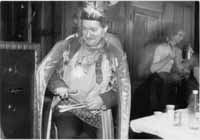Stephen M. Wolownik facts for kids
Stephen M. "Steve" Wolownik (born July 22, 1946, died May 18, 2000) was a very important person in Russian and Eastern European music in the United States. He helped start the Balalaika and Domra Association of America. This group helps share traditional Russian music.
Contents
Steve Wolownik's Life Story
Steve Wolownik was born in Chester, Pennsylvania. He grew up surrounded by Russian and Ukrainian music.
Early Musical Journey
When he was young, Steve played in a balalaika orchestra. This was at St. Nicholas's Russian Orthodox Church in Philadelphia. His teachers included Paul Kauriga and Anastasia Karnow.
College and New Orchestras
Steve went to the University of Pennsylvania. There, he earned his first college degree. In 1964, he started the University of Pennsylvania Balalaika Orchestra. People often called it "PennBO." This orchestra was special. It was one of the only university groups focused only on Eastern European music.
Later, Steve moved to Los Angeles. He earned another degree from the University of California, Los Angeles. This degree was in ethnomusicology, which is the study of music from different cultures. While in Los Angeles, he started another balalaika group called the Odessa Balalaikas. He also started groups in Houston and Atlanta.
After returning to Philadelphia, Steve earned a degree in library science from Drexel University. He then worked as a librarian at the Lippincott Library. He also helped create two more balalaika groups: The Balalaika Russe and The Gypsy Balalaikas. Both groups were made up of musicians from the Philadelphia area.
Steve continued to lead the Penn Balalaika Orchestra until 1996. He later moved to Mount Laurel, New Jersey. He worked as an assistant library director there until he passed away in 2000. Steve Wolownik is buried in Lawn Croft Cemetery in Linwood, Pennsylvania.
Steve Wolownik's Impact on Music
Steve Wolownik is known for bringing back a special style of balalaika music. This was the "cabaret-style" ensemble. He also helped connect the balalaika and domra instruments to their traditional roots.
Cabaret-Style Music
In the early 1900s, cabaret-style groups were popular. These groups usually had fewer than 10 members. They played in small, cozy places. Their music was not always strictly Russian. It often included Gypsy, Jewish, or Ukrainian tunes.
This style became less popular when Communism grew. The Soviet government preferred large, state-run ensembles. These groups had many musicians and grand arrangements.
Spreading Eastern European Music
Steve Wolownik started balalaika groups in Atlanta, Maine, and Pennsylvania. He was well-known for his simple but beautiful music arrangements. These were for small balalaika groups.
He didn't just play Russian music. He also arranged tunes from Romania, Hungary, Moldavia, and klezmer music. Some of these songs had never been played on balalaikas before.
A Playful Musician
Some people said Steve Wolownik was like the "skomorokhi" of old Russia. These were street musicians who often made fun of leaders and the church. Steve had a great sense of humor.
Today, the Balalaika and Domra Association of America has hundreds of members. They work to promote traditional Russian music in the United States. They hold a yearly meeting where famous Russian musicians teach and perform.
Images for kids
 | Sharif Bey |
 | Hale Woodruff |
 | Richmond Barthé |
 | Purvis Young |



